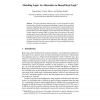Free Online Productivity Tools
i2Speak
i2Symbol
i2OCR
iTex2Img
iWeb2Print
iWeb2Shot
i2Type
iPdf2Split
iPdf2Merge
i2Bopomofo
i2Arabic
i2Style
i2Image
i2PDF
iLatex2Rtf
Sci2ools
127
click to vote
AMAST
2010
Springer
2010
Springer
Matching Logic: An Alternative to Hoare/Floyd Logic
Abstract. This paper introduces matching logic, a novel framework for defining axiomatic semantics for programming languages, inspired from operational semantics. Matching logic specifications are particular first-order formulae with constrained algebraic structure, called patterns. Program configurations satisfy patterns iff they match their algebraic structure and satisfy their constraints. Using a simple imperative language (IMP), it is shown that a restricted use of the matching logic proof system is equivalent to IMP's Hoare logic proof system, in that any proof derived using either can be turned into a proof using the other. Extensions to IMP including a heap with dynamic memory allocation and pointer arithmetic are given, requiring no extension of the underlying first-order logic; moreover, heap patterns such as lists, trees, queues, graphs, etc., are given algebraically using fist-order constraints over patterns.
Related Content
| Added | 12 May 2011 |
| Updated | 12 May 2011 |
| Type | Journal |
| Year | 2010 |
| Where | AMAST |
| Authors | Grigore Rosu, Chucky Ellison, Wolfram Schulte |
Comments (0)

